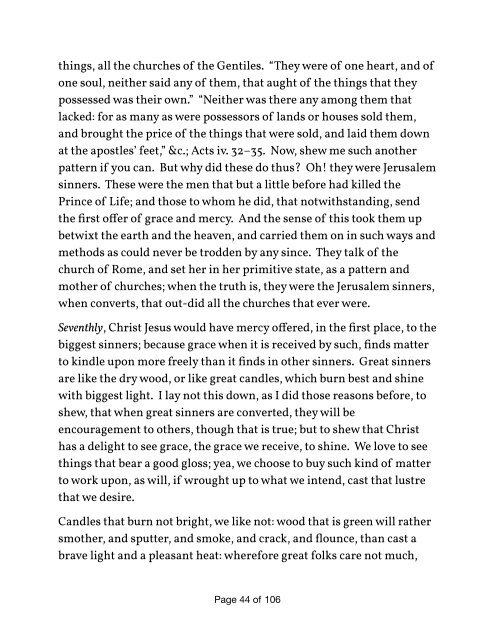The Jerusalem Sinner Saved; or Good News for the Vilest of Men by John Bunyan 1689
An encouraging book for those who feel guilty about their sins. It is a wonderful reminder that Christ's grace to his people knows no bounds and that his power to save even the worst sinner is not limited. "I have been vile myself, but I have obtained mercy; and I would have my companions in sin partake of mercy too: and therefore, I have writ this little book." Thus wrote John Bunyan about this unique gem. The premise of this book is that Jesus wanted his disciples to proclaim the gospel to the worst of sinners - those in Jerusalem who crucified their Messiah. To Bunyan's mind, this was the worst possible sin. The apostles were to begin there, with these worst of sinners, because, in Christ's eyes, they had the greatest need. Also, when they believed in Christ, his name would receive the greatest fame, and thus others would be encouraged to come to Christ. The kingdom of Satan would then be weakened, and the tempted and the weak would be helped. Further, the greatest sinners would love Christ the most when saved, and those who refused to repent would be left with no excuse. To Bunyan's way of thinking, this command to preach the gospel to "Jerusalem sinners" shows the gracious intentions of Christ toward men and his sufficiency to save the worst of sinners, and gives encouragement to those who think that their sin is too great to be forgiven.
An encouraging book for those who feel guilty about their sins. It is a wonderful reminder that Christ's grace to his people knows no bounds and that his power to save even the worst sinner is not limited.
"I have been vile myself, but I have obtained mercy; and I would have my companions in sin partake of mercy too: and therefore, I have writ this little book." Thus wrote John Bunyan about this unique gem.
The premise of this book is that Jesus wanted his disciples to proclaim the gospel to the worst of sinners - those in Jerusalem who crucified their Messiah. To Bunyan's mind, this was the worst possible sin. The apostles were to begin there, with these worst of sinners, because, in Christ's eyes, they had the greatest need. Also, when they believed in Christ, his name would receive the greatest fame, and thus others would be encouraged to come to Christ. The kingdom of Satan would then be weakened, and the tempted and the weak would be helped. Further, the greatest sinners would love Christ the most when saved, and those who refused to repent would be left with no excuse. To Bunyan's way of thinking, this command to preach the gospel to "Jerusalem sinners" shows the gracious intentions of Christ toward men and his sufficiency to save the worst of sinners, and gives encouragement to those who think that their sin is too great to be forgiven.
You also want an ePaper? Increase the reach of your titles
YUMPU automatically turns print PDFs into web optimized ePapers that Google loves.
things, all <strong>the</strong> churches <strong>of</strong> <strong>the</strong> Gentiles. “<strong>The</strong>y were <strong>of</strong> one heart, and <strong>of</strong><br />
one soul, nei<strong>the</strong>r said any <strong>of</strong> <strong>the</strong>m, that aught <strong>of</strong> <strong>the</strong> things that <strong>the</strong>y<br />
possessed was <strong>the</strong>ir own.” “Nei<strong>the</strong>r was <strong>the</strong>re any among <strong>the</strong>m that<br />
lacked: f<strong>or</strong> as many as were possess<strong>or</strong>s <strong>of</strong> lands <strong>or</strong> houses sold <strong>the</strong>m,<br />
and brought <strong>the</strong> price <strong>of</strong> <strong>the</strong> things that were sold, and laid <strong>the</strong>m down<br />
at <strong>the</strong> apostles’ feet,” &c.; Acts iv. 32–35. Now, shew me such ano<strong>the</strong>r<br />
pattern if you can. But why did <strong>the</strong>se do thus? Oh! <strong>the</strong>y were <strong>Jerusalem</strong><br />
sinners. <strong>The</strong>se were <strong>the</strong> men that but a little bef<strong>or</strong>e had killed <strong>the</strong><br />
Prince <strong>of</strong> Life; and those to whom he did, that notwithstanding, send<br />
<strong>the</strong> first <strong>of</strong>fer <strong>of</strong> grace and mercy. And <strong>the</strong> sense <strong>of</strong> this took <strong>the</strong>m up<br />
betwixt <strong>the</strong> earth and <strong>the</strong> heaven, and carried <strong>the</strong>m on in such ways and<br />
methods as could never be trodden <strong>by</strong> any since. <strong>The</strong>y talk <strong>of</strong> <strong>the</strong><br />
church <strong>of</strong> Rome, and set her in her primitive state, as a pattern and<br />
mo<strong>the</strong>r <strong>of</strong> churches; when <strong>the</strong> truth is, <strong>the</strong>y were <strong>the</strong> <strong>Jerusalem</strong> sinners,<br />
when converts, that out-did all <strong>the</strong> churches that ever were.<br />
Seventhly, Christ Jesus would have mercy <strong>of</strong>fered, in <strong>the</strong> first place, to <strong>the</strong><br />
biggest sinners; because grace when it is received <strong>by</strong> such, finds matter<br />
to kindle upon m<strong>or</strong>e freely than it finds in o<strong>the</strong>r sinners. Great sinners<br />
are like <strong>the</strong> dry wood, <strong>or</strong> like great candles, which burn best and shine<br />
with biggest light. I lay not this down, as I did those reasons bef<strong>or</strong>e, to<br />
shew, that when great sinners are converted, <strong>the</strong>y will be<br />
encouragement to o<strong>the</strong>rs, though that is true; but to shew that Christ<br />
has a delight to see grace, <strong>the</strong> grace we receive, to shine. We love to see<br />
things that bear a good gloss; yea, we choose to buy such kind <strong>of</strong> matter<br />
to w<strong>or</strong>k upon, as will, if wrought up to what we intend, cast that lustre<br />
that we desire.<br />
Candles that burn not bright, we like not: wood that is green will ra<strong>the</strong>r<br />
smo<strong>the</strong>r, and sputter, and smoke, and crack, and flounce, than cast a<br />
brave light and a pleasant heat: wheref<strong>or</strong>e great folks care not much,<br />
Page<br />
44 <strong>of</strong> 106

















